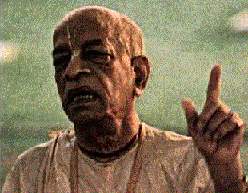
by International Chess Master
The essential scripture for the movement, the famous 5,000-year-old Bhagavad Gita, spoken by Lord Krsna, God Himself, explains that religious principles, although beginningless, are revived periodically by Him or His authorized representative only, the purpose remaining the same, although due to time, climate and circumstances, the details emphasized may vary.
 |
The Hare Krsna movement's western founder, His Divine Grace A.C. Bhaktivedanta Swami Prabhupada, has written elaborate English commentaries on Bhagavad-Gita and other sacred Vedic texts which have been translated into almost every language.
Prabhupada, being a bonafide "guru" directly in the line of Sri Chaitanya, does not distort the Gita's clear message of devotional theism. Hence his writings, which have astounded literary communities worldwide, are used as standard textbooks in numerous educational institutions.
Therefore "Hare Krsna" is a cultural, philosophical and religious movement which is intended for the reformation of the entire human society. "Hare" means the "devotional energy of God," and "Krsna" and "Rama" mean "the Supreme Personality of Godhead".
According to the example and percepts of Sri Chaitanya, the easiest way to reawaken our dormant Krsna Consciousness, or Love for God, is by vibrating the mantra, "Hare Krsna, Hare Krsna, Krsna, Krsna, Hare Hare; Hare Rama, Hare Rama, Rama Rama, Hare Hare." These 16 syllables are called the "maha-mantra," or "great chant".
The Bhagavata Purana, or Srimad-Bhagavatam (in 12 cantos), is the post-graduate study of Bhagavad-Gita. Elaborated therein are varieties of recorded activities or "pastimes" of the Supreme God, compiled by the unrivaled Vedic authority, Srila Vyasadeva (author of Mahabharata, which contains Bhagavad-Gita).
Familiarity with this work will enable the serious and sincere student to understand all about God and His potencies, thereby providing tangible meaning to the otherwise abstract goal of "loving" Him unconditionally.
Regrettably, after the departure of Srila Prabhupada in 1977, the institution he founded, ISKCON, became embroiled in a phenomenal amount of negative publicity. This can be entirely traced to the recently surfacing massive evidence that Prabhupada was poisoned to death, most likely by a coterie of his ambitious secretaries, who have been, since then, posing as his successors.
The 400+ page "Someone Has Poisoned Me", which documents extensive evidence of the poisoning, can be obtained for free (the publisher requests a donation of $5) from Vedic Village, P.O.B. 28, Efland, NC 27243 (rivervillage@mindspring.com) 1-800-242-0115.
All glories to His Divine Grace A. C. Bhaktivedanta Swami Prabhupada!
If you like, you can add the following to my article on your website: "Srila Prabhupada prophesized, in his Bhaktivedanta Purports, that rogues and nondevotees would cause havoc after his departure, and his sincere disciples would try to rectify the situation. The Prabhupada Sankirtana Society, headquarters: 48 Ave. B, NY, NY 10009, [212] 674 0698, PSS108@juno.com, was established for this purpose. Please contact Kapindra Swami, temple president, to learn how to participate in this great mission."